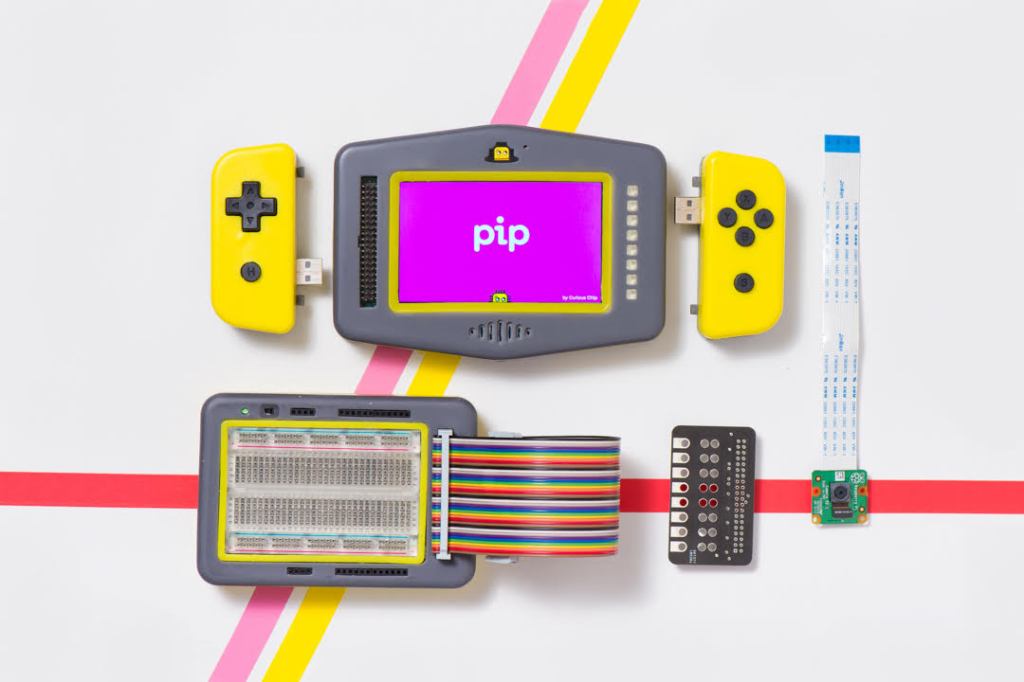The Raspberry Pi Foundation has been incredibly successful at sparking all sorts of creativity via its low cost microcomputers, which arrived in the market back in 2012. Its core electronics are also indirectly responsible for UK-based learn-to-code startups like Kano and pi-top, which have built devices and VC-backed businesses atop Pi.
Well here’s another UK startup using Pi electronics as the foundation for an edtech business idea. Their device-in-the-making Pip, which is currently raising crowdfunds on Kickstarter, is powered by the Raspberry Pi Compute Module set within a handheld console gaming casing that packs a touchscreen, plus speaker, control buttons, multiple ports and even some colored LEDs.
The idea is to engage kids with a retro games device which also doubles as a code learning environment via a browser-based platform, called Curiosity. A second strand to their concept will invite budding hardware hackers to get plugging and playing via a connector on the console that can be used with a maker expansion pack that contains a breadboard attachment for tinkering and learning about electronics.
The team says their software platform will support coding in JavaScript, Python, Lua, HTML/CSS and PHP. While the device will be bundled with step-by-step tutorials to “show the basics” — from coding Snake, to making LEDs flash, to, they claim, “programing smart devices”.
That’s the grand vision. For now Pip remains a prototype — and the Glasgow, UK based startup still needs to reach its £30k funding goal on Kickstarter, though it’s already around half way there after a few days running the campaign.
Early bird pre-order pricing for the Pip device is £150, with the intended future RRP being £200.
It’s true that kids today are already pretty spoiled for choice when it comes to learn to code and/or hardware hack gizmos parents can buy them. So we asked Pip’s founders what makes their approach different?
They described “pocket-sized portability” as Pip’s “main USP” — combined with its “integrated touchscreen and friction-free, open-ended programmability”.
“Pip is compatible with cheap electronics components that can be bought anywhere, as well as the thriving Raspberry Pi HAT ecosystem,” said co-founders Sukhvir Dhillon and Jason Frame.
“Pip makes use of standard languages and tools. Yes, it supports block-based programming for beginners, but once they’re ready to move on we will support for a number of popular languages… all of which have a huge number of freely available resources online for learning.
“Our role in this is to remove the barriers between idea and creation, making these tools immediately usable. Then you can take this knowledge and skill to go on to make things beyond the Pip platform.”
They also noted that Pip is also “still a Pi” — meaning users “can easily swap the SD card, and Pip can become a capable desktop computer (when connected to a monitor, mouse and keyboard), or even a portable RetroPie-powered emulation station”.
Having a goal to support open standards and standard programming languages could indeed make for a device with greater longevity and utility than a learn to code gadget that only supports ‘programming’ via a proprietary and over simplified code blocks system (say), which a child may soon outgrow.
Although very many learn to code devices will fail to make any serious dent in learning outcomes without the support of educational institutions to establish use of the device within a more structured learning environment — to counteract the problem of individual kids getting bored and putting the toy away in a drawer.
Pip’s co-founders are initially targeting the product at parents (and/or ‘big kid’ makers) but say their long term goal is to get the product (and accompanying subscription-based software platform) into educational institutions.
“The software has been developed in such a way that students can write code and test it on whatever equipment the school has available, before running it on Pip itself — this means that schools are not forced to purchase one Pip for every student,” they noted.
The bootstrapping team has been developing Pip since late 2016, taking in some support from Scottish Enterprise but without any formal investors.
At this stage they say they’ve built five working prototypes of their pre-production v5 model — including “custom circuit board built around the Raspberry Pi Compute Module and associated peripherals, high resolution touchscreen, built-in battery, six-piece resin-cast case with integrated kickstand”.
Though there’s clearly still a long way to turn the prototype into shipping product.
They have a Kickstarter timeline of August-September 2018 for shipping Pip to backers. But as ever with crowdfunding campaigns the usual strong caveats apply: You’re making a bet on an idea that may never come to fruition. Many crowdfunded projects fail entirely to deliver.
Hardware can also be especially complex. And even if a device makes it, it may take longer than expected and not be exactly what was originally billed — so, if you are happy to take a punt, it also pays to expect delays and not get too hung up on specific details.






























Comment